Cholera: lives saved in Katanga
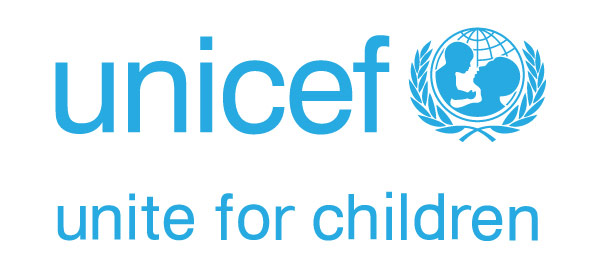
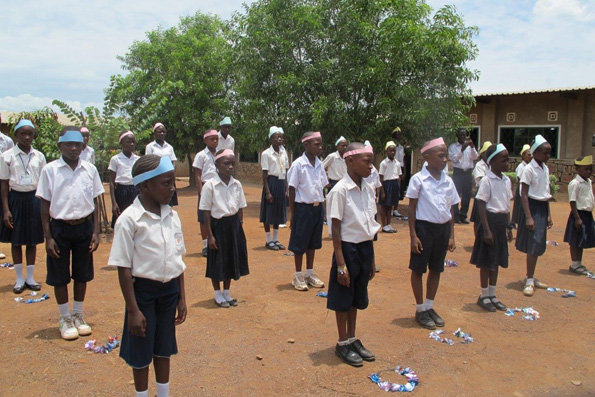
The welcome at Saint-Philippe school. © UNICEF Belgium – Isabelle Wolff
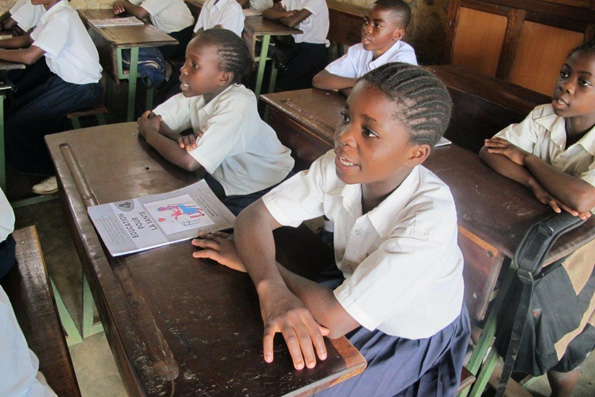
The course on water at the school. © UNICEF Belgium – Isabelle Wolff
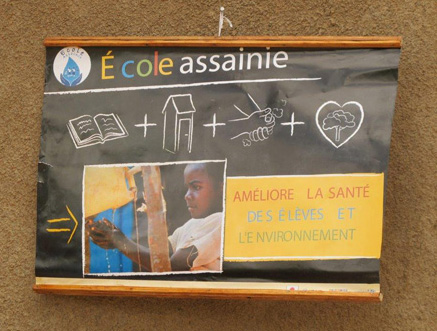
The poster for sanitized schools. © UNICEF Belgium – Isabelle Wolff
In just over two years, 31 schools in Katanga are now cholera-free and 30 others will soon be thanks to the support of the Brussels-Capital Region (BCR). The aim is to improve the hygiene of the 18,000 pupils in the suburbs around Lubumbashi, the capital of Katanga, over a three-year period.
Isabelle Wolff, the head of programmes at UNICEF Belgium, who recently returned from a field trip to Katanga, reflects on the progress made in the fight against cholera, with the support of the BCR. The Brussels-Capital Region has concluded a partnership agreement with the southern province of the Democratic Republic of Congo (DRC): “On my first day there, I was warned that a cholera epidemic was raging in the city. A UNICEF DRC colleague taught me the essential hygiene rules: “Cholera is highly contagious. Wash your hands well and only drink purified water. If you experience any symptoms, warn us immediately as you really need to act fast.” Well, at least I couldn’t say that I hadn’t been warned! Informing and educating children about good hygiene practices in regions where cholera attacks the population: that is precisely the objective of the BCR’s support.”
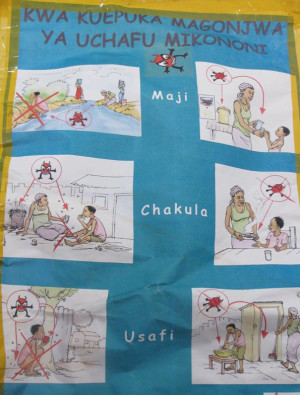 Less than one in two people drink drinking water
“These instructions seem quite simple. But how can the children there put them into practice? The families have very little to live on. Less than one in two drink drinking water and only one in ten uses a toilet. And this needs to change. We need to install toilets, hand-washing facilities, water pumps, teach them key good hygiene practices. In order to do this, the villagers and schools receive the support of the authorities and of UNICEF. The BCR has invested 640,000 euros in the “Sanitized Villages and Schools programme”.
“We visited the primary school of Saint-Philippe and were welcomed in a solemn yet festive way. The children were in the schoolyard singing to welcome us. They then repeated the slogans, which one student, the brigadier general of hygiene, shouted out: “A sanitized school, a clean school, a sanitized school, zero microbes.” The school is currently undergoing a transformation. The headmaster asked to join the programme and since then the teachers have been trained. The children elected certain pupils who make up the school’s hygiene brigade.”
How to obtain clean water?
“I attended a class in the fourth year of the primary school on contaminated water. The teacher asked the children some questions, made them think. The slogans that the children repeated in the schoolyard were explained. It is fascinating to see how practical this class is: the children learn why water is contaminated, which illnesses they can contract and how to find clean water without having to buy it. “You need to boil it”, the professor repeated during a practical demonstration. All the classes received textbooks and work with the theme of health and hygiene once a week with their teacher. As soon as the construction of the latrines and the hand-washing facilities is finished and the water pump is installed on the well, the school will be certified as sanitized. Naturally, keeping the toilets clean and functional as well as good hygiene habits will continue to be a daily challenge for the students and teachers alike.”
“I left the school feeling confident. The project is progressing well. That same evening, Mamadou Mouctar Baldé, who is the head of the programme at UNICEF RDC, confirmed that this work was useful: “We see very few cases of cholera in areas with sanitized villages or schools. The population is aware of the issue there and is doing what it takes to prevent this disease. The correlation is obvious, this really protects them.””
UNICEF, the BCR and the other partners have no intention of stopping at this point. Every child needs to learn how to prevent disease.
Find out more: UNICEF Belgium on Facebook
Less than one in two people drink drinking water
“These instructions seem quite simple. But how can the children there put them into practice? The families have very little to live on. Less than one in two drink drinking water and only one in ten uses a toilet. And this needs to change. We need to install toilets, hand-washing facilities, water pumps, teach them key good hygiene practices. In order to do this, the villagers and schools receive the support of the authorities and of UNICEF. The BCR has invested 640,000 euros in the “Sanitized Villages and Schools programme”.
“We visited the primary school of Saint-Philippe and were welcomed in a solemn yet festive way. The children were in the schoolyard singing to welcome us. They then repeated the slogans, which one student, the brigadier general of hygiene, shouted out: “A sanitized school, a clean school, a sanitized school, zero microbes.” The school is currently undergoing a transformation. The headmaster asked to join the programme and since then the teachers have been trained. The children elected certain pupils who make up the school’s hygiene brigade.”
How to obtain clean water?
“I attended a class in the fourth year of the primary school on contaminated water. The teacher asked the children some questions, made them think. The slogans that the children repeated in the schoolyard were explained. It is fascinating to see how practical this class is: the children learn why water is contaminated, which illnesses they can contract and how to find clean water without having to buy it. “You need to boil it”, the professor repeated during a practical demonstration. All the classes received textbooks and work with the theme of health and hygiene once a week with their teacher. As soon as the construction of the latrines and the hand-washing facilities is finished and the water pump is installed on the well, the school will be certified as sanitized. Naturally, keeping the toilets clean and functional as well as good hygiene habits will continue to be a daily challenge for the students and teachers alike.”
“I left the school feeling confident. The project is progressing well. That same evening, Mamadou Mouctar Baldé, who is the head of the programme at UNICEF RDC, confirmed that this work was useful: “We see very few cases of cholera in areas with sanitized villages or schools. The population is aware of the issue there and is doing what it takes to prevent this disease. The correlation is obvious, this really protects them.””
UNICEF, the BCR and the other partners have no intention of stopping at this point. Every child needs to learn how to prevent disease.
Find out more: UNICEF Belgium on Facebook
 Less than one in two people drink drinking water
“These instructions seem quite simple. But how can the children there put them into practice? The families have very little to live on. Less than one in two drink drinking water and only one in ten uses a toilet. And this needs to change. We need to install toilets, hand-washing facilities, water pumps, teach them key good hygiene practices. In order to do this, the villagers and schools receive the support of the authorities and of UNICEF. The BCR has invested 640,000 euros in the “Sanitized Villages and Schools programme”.
“We visited the primary school of Saint-Philippe and were welcomed in a solemn yet festive way. The children were in the schoolyard singing to welcome us. They then repeated the slogans, which one student, the brigadier general of hygiene, shouted out: “A sanitized school, a clean school, a sanitized school, zero microbes.” The school is currently undergoing a transformation. The headmaster asked to join the programme and since then the teachers have been trained. The children elected certain pupils who make up the school’s hygiene brigade.”
How to obtain clean water?
“I attended a class in the fourth year of the primary school on contaminated water. The teacher asked the children some questions, made them think. The slogans that the children repeated in the schoolyard were explained. It is fascinating to see how practical this class is: the children learn why water is contaminated, which illnesses they can contract and how to find clean water without having to buy it. “You need to boil it”, the professor repeated during a practical demonstration. All the classes received textbooks and work with the theme of health and hygiene once a week with their teacher. As soon as the construction of the latrines and the hand-washing facilities is finished and the water pump is installed on the well, the school will be certified as sanitized. Naturally, keeping the toilets clean and functional as well as good hygiene habits will continue to be a daily challenge for the students and teachers alike.”
“I left the school feeling confident. The project is progressing well. That same evening, Mamadou Mouctar Baldé, who is the head of the programme at UNICEF RDC, confirmed that this work was useful: “We see very few cases of cholera in areas with sanitized villages or schools. The population is aware of the issue there and is doing what it takes to prevent this disease. The correlation is obvious, this really protects them.””
UNICEF, the BCR and the other partners have no intention of stopping at this point. Every child needs to learn how to prevent disease.
Find out more: UNICEF Belgium on Facebook
Less than one in two people drink drinking water
“These instructions seem quite simple. But how can the children there put them into practice? The families have very little to live on. Less than one in two drink drinking water and only one in ten uses a toilet. And this needs to change. We need to install toilets, hand-washing facilities, water pumps, teach them key good hygiene practices. In order to do this, the villagers and schools receive the support of the authorities and of UNICEF. The BCR has invested 640,000 euros in the “Sanitized Villages and Schools programme”.
“We visited the primary school of Saint-Philippe and were welcomed in a solemn yet festive way. The children were in the schoolyard singing to welcome us. They then repeated the slogans, which one student, the brigadier general of hygiene, shouted out: “A sanitized school, a clean school, a sanitized school, zero microbes.” The school is currently undergoing a transformation. The headmaster asked to join the programme and since then the teachers have been trained. The children elected certain pupils who make up the school’s hygiene brigade.”
How to obtain clean water?
“I attended a class in the fourth year of the primary school on contaminated water. The teacher asked the children some questions, made them think. The slogans that the children repeated in the schoolyard were explained. It is fascinating to see how practical this class is: the children learn why water is contaminated, which illnesses they can contract and how to find clean water without having to buy it. “You need to boil it”, the professor repeated during a practical demonstration. All the classes received textbooks and work with the theme of health and hygiene once a week with their teacher. As soon as the construction of the latrines and the hand-washing facilities is finished and the water pump is installed on the well, the school will be certified as sanitized. Naturally, keeping the toilets clean and functional as well as good hygiene habits will continue to be a daily challenge for the students and teachers alike.”
“I left the school feeling confident. The project is progressing well. That same evening, Mamadou Mouctar Baldé, who is the head of the programme at UNICEF RDC, confirmed that this work was useful: “We see very few cases of cholera in areas with sanitized villages or schools. The population is aware of the issue there and is doing what it takes to prevent this disease. The correlation is obvious, this really protects them.””
UNICEF, the BCR and the other partners have no intention of stopping at this point. Every child needs to learn how to prevent disease.
Find out more: UNICEF Belgium on Facebook 

